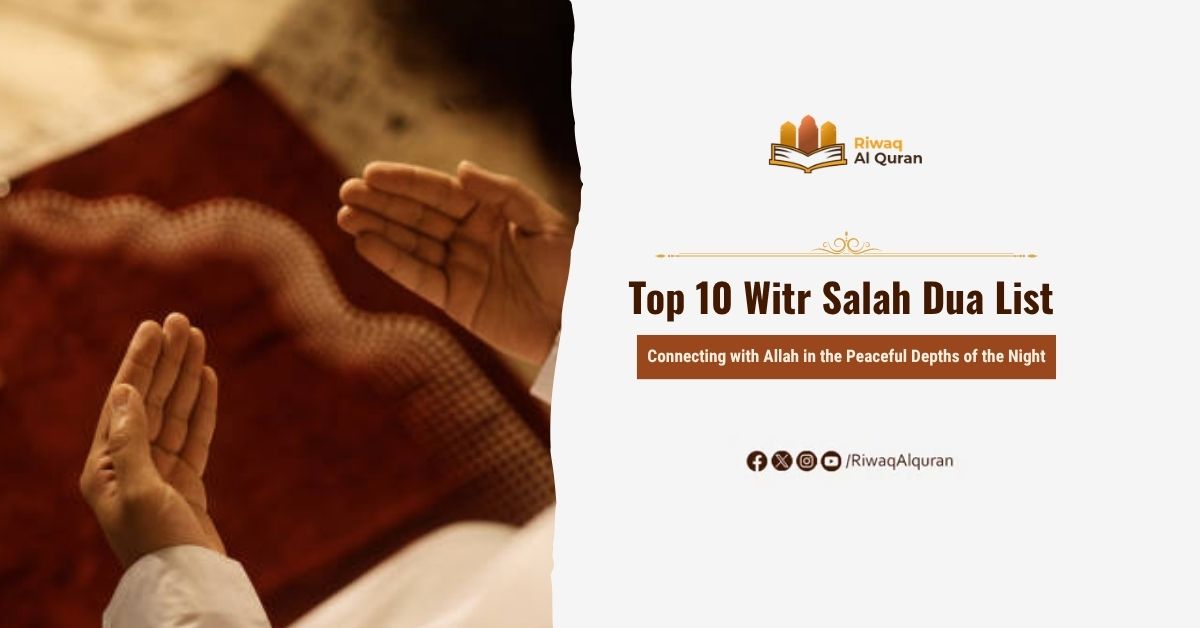Connecting with Allah in the Peaceful Depths of the Night
The final prayer of the day—Witr Salah—holds a unique and profound place in Islamic worship. It’s a time of spiritual solitude, sincerity, and intimate connection with Allah.
And during this blessed prayer, there’s a beautiful moment reserved just for supplication: Dua al-Witr, also known as Dua e Witr, or the Qunoot Dua in Witr.
Whether you’re seeking guidance, forgiveness, strength, or gratitude, this special part of the Witr prayer is your opportunity to pour your heart out.
Table of Contents
Powerful Duas for Witr Salah
The Witr Salah is a deeply spiritual moment that allows for intimate communication with Allah, especially during the calm and quiet of the night. One of its most distinctive features is the Qunoot Dua, a powerful and comprehensive supplication that the Prophet Muhammad ﷺ taught us to recite. In addition to this, there are other heartfelt duas you can say during Witr, especially in sujood or after the prayer is complete.
Here are several authentic and powerful duas for Witr Salah to help you draw closer to Allah:
1. The Qunoot Dua (Dua e Witr / Dua Witr Qunoot)
This is the central dua recited during Witr prayer, usually after ruku in the final rak’ah.
Arabic:
اللَّهُمَّ اهْدِنِي فِيمَنْ هَدَيْتَ، وَعَافِنِي فِيمَنْ عَافَيْتَ، وَتَوَلَّنِي فِيمَنْ تَوَلَّيْتَ، وَبَارِكْ لِي فِيمَا أَعْطَيْتَ، وَقِنِي شَرَّ مَا قَضَيْتَ، فَإِنَّكَ تَقْضِي وَلَا يُقْضَى عَلَيْكَ، وَإِنَّهُ لَا يَذِلُّ مَنْ وَالَيْتَ، وَلَا يَعِزُّ مَنْ عَادَيْتَ، تَبَارَكْتَ رَبَّنَا وَتَعَالَيْتَ
Transliteration:
Allāhumma ihdinī fīman hadayt, wa ‘āfinī fīman ‘āfayt, wa tawallani fīman tawallayt, wa bārik lī fīmā a‘ṭayt, wa qinī sharra mā qaḍayt, fa innaka taqḍī wa lā yuqḍā ‘alayk, wa innahu lā yadhillu man wālayt, wa lā ya‘izzu man ‘ādayt, tabārakta rabbana wa ta‘ālayt.
Translation:
“O Allah, guide me among those You have guided, grant me well-being among those You’ve granted well-being, take me into Your care among those You have taken into Your care, bless me in what You’ve given, and protect me from the evil You’ve decreed. Surely, You decree, and none can pass decree over You. Truly, he to whom You show loyalty is never humiliated, and he whom You take as an enemy is never honored. Blessed are You, our Lord, and Exalted.”
2. Dua in Witr for Mercy and Protection
This dua was beloved by the Prophet ﷺ and can be recited during sujood or after the Qunoot.
Arabic:
اللَّهُمَّ إِنِّي أَعُوذُ بِرِضَاكَ مِنْ سَخَطِكَ، وَبِمُعَافَاتِكَ مِنْ عُقُوبَتِكَ، وَأَعُوذُ بِكَ مِنْكَ، لَا أُحْصِي ثَنَاءً عَلَيْكَ، أَنْتَ كَمَا أَثْنَيْتَ عَلَى نَفْسِكَ
Transliteration:
Allāhumma innī a‘ūdhu bi-riḍāka min sakhaṭik, wa bi-mu‘āfātika min ‘uqūbatik, wa a‘ūdhu bika minka, lā uḥṣī thanā’an ‘alayk, anta kamā athnayta ‘alā nafsik.
Translation:
“O Allah, I seek refuge in Your pleasure from Your anger and in Your protection from Your punishment. I seek refuge in You from You. I cannot praise You enough; You are as You have praised Yourself.”
3. Quranic Dua for Establishing Prayer
Recite this to ask Allah to keep you and your family firm in worship—especially fitting during Witr.
Arabic:
رَبِّ اجْعَلْنِي مُقِيمَ الصَّلَاةِ وَمِنْ ذُرِّيَّتِي ۚ رَبَّنَا وَتَقَبَّلْ دُعَاءِ
— Surah Ibrahim (14:40)
Transliteration:
Rabbij ‘alnī muqīma aṣ-ṣalāti wa min dhurriyyatī, rabbanā wa taqabbal du‘ā’.
Translation:
“My Lord, make me an establisher of prayer, and [many] from my descendants. Our Lord, accept my supplication.”
4. Dua in Witr for Light and Guidance
A beautiful night-time dua asking for light in your heart and life.
Arabic:
اللَّهُمَّ اجْعَلْ فِي قَلْبِي نُورًا، وَفِي لِسَانِي نُورًا، وَاجْعَلْ فِي سَمْعِي نُورًا، وَفِي بَصَرِي نُورًا، وَمِنْ فَوْقِي نُورًا، وَمِنْ تَحْتِي نُورًا، وَعَنْ يَمِينِي نُورًا، وَعَنْ شِمَالِي نُورًا، وَمِنْ أَمَامِي نُورًا، وَمِنْ خَلْفِي نُورًا، وَاجْعَلْ فِي نَفْسِي نُورًا، وَأَعْظِمْ لِي نُورًا
Transliteration:
Allāhumma ij‘al fī qalbī nūran, wa fī lisānī nūran, wa ij‘al fī sam‘ī nūran, wa fī baṣarī nūran, wa min fawqī nūran, wa min taḥtī nūran, wa ‘an yamīnī nūran, wa ‘an shimālī nūran, wa min amāmī nūran, wa min khalfī nūran, wa ij‘al fī nafsī nūran, wa a‘ẓim lī nūran.
Translation:
“O Allah, place light in my heart, and on my tongue light, and in my hearing light, and in my sight light, and above me light, and beneath me light, and on my right light, and on my left light, and before me light, and behind me light, and in my soul light. Make my light great.”
5. Dua for Forgiveness During Witr (from Laylatul Qadr Hadith)
This is a simple yet extremely powerful dua for Witr Salah, especially in the last nights of Ramadan—but valuable every night.
Arabic:
اللَّهُمَّ إِنَّكَ عَفُوٌّ تُحِبُّ الْعَفْوَ فَاعْفُ عَنِّي
Transliteration:
Allāhumma innaka ‘afuwwun tuḥibbul-‘afwa fa‘fu ‘annī.
Translation:
“O Allah, You are Most Forgiving, and You love to forgive, so forgive me.”
Tip: Use this concise dua repeatedly during Dua al-Witr, especially when you feel overwhelmed or unable to remember longer supplications.
6. Dua in Witr for Strength in Faith and Steadfastness
Arabic:
يَا مُقَلِّبَ الْقُلُوبِ، ثَبِّتْ قَلْبِي عَلَى دِينِكَ
Transliteration:
Yā Muqallibal-qulūb, thabbit qalbī ‘alā dīnik.
Translation:
“O Turner of the hearts, keep my heart firm upon Your religion.”
This is a beautiful dua to add to your Witr Salah, asking Allah for spiritual strength and consistency in faith.
7. Dua for Paradise and Protection from Hellfire
This is a powerful addition to your dua e witr when asking for the ultimate success in the Hereafter.
Arabic:
اللَّهُمَّ إِنِّي أَسْأَلُكَ الْجَنَّةَ، وَأَعُوذُ بِكَ مِنَ النَّارِ
Transliteration:
Allāhumma innī as’aluka al-jannata, wa a‘ūdhu bika mina al-nār.
Translation:
“O Allah, I ask You for Paradise and seek refuge in You from the Hellfire.”
You can say this during sujood or include it in your dua in Witr.
8. Dua for Righteous Offspring and Family Peace
A meaningful dua in Witr, especially for parents and caretakers.
Arabic:
رَبَّنَا هَبْ لَنَا مِنْ أَزْوَاجِنَا وَذُرِّيَّاتِنَا قُرَّةَ أَعْيُنٍ وَاجْعَلْنَا لِلْمُتَّقِينَ إِمَامًا
— Surah Al-Furqan (25:74)
Transliteration:
Rabbana hab lanā min azwājinā wa dhurriyyātinā qurrata a‘yunin waj‘alnā lil-muttaqīna imāmā.
Translation:
“Our Lord, grant us from among our spouses and offspring comfort to our eyes and make us an example for the righteous.”
9. Dua for Healing and Relief from Hardship
If you’re struggling with illness, anxiety, or trials, this is a heartfelt dua to recite during Witr Salah.
Arabic:
اللَّهُمَّ رَبَّ النَّاسِ، أَذْهِبِ الْبَأْسَ، اشْفِ أَنْتَ الشَّافِي، لَا شِفَاءَ إِلَّا شِفَاؤُكَ، شِفَاءً لَا يُغَادِرُ سَقَمًا
Transliteration:
Allāhumma Rabb an-nās, adhhib al-ba’s, ishfi anta ash-shāfī, lā shifā’a illā shifā’uk, shifā’an lā yughādir saqaman.
Translation:
“O Allah, Lord of mankind, remove the harm and cure [me]; You are the Healer. There is no cure but Yours, a cure that leaves no illness behind.”
10. Dua in Witr for a Good End (Husn al-Khatimah)
A profound and emotional dua to include in your Witr Salah to seek a beautiful conclusion to your life.
Arabic:
اللَّهُمَّ اجْعَلْ خَيْرَ أَعْمَالِنَا خَوَاتِيمَهَا، وَخَيْرَ أَيَّامِنَا يَوْمَ نَلْقَاكَ
Transliteration:
Allāhumma ij‘al khayra a‘mālinā khawātimahā, wa khayra ayyāminā yawma nalqāk.
Translation:
“O Allah, make the best of our deeds the last of them, and the best of our days the day we meet You.”
These duas during Witr Salah serve as a spiritual shield and a source of tranquility. Whether you’re reciting the Qunoot Dua Witr, making personal supplications in sujood, or praying for your future in this world and the next, these words connect you deeply with Allah’s mercy and power.


Significance of Dua in Witr
The Witr prayer is not just the final prayer of the day—it is a spiritual closing that carries immense weight in the life of a believer. Within it lies one of the most moving and humbling acts of worship: dua.
In the stillness of the night, when distractions are few and hearts are soft, Witr Salah becomes a sacred moment of intimate dialogue with Allah. The dua in Witr, particularly the Qunoot dua, is a time to admit our shortcomings, ask for mercy, beg for guidance, and pour out our deepest hopes and fears.
The Prophet ﷺ emphasized the value of Witr, calling it a distinguishing prayer of the believer:
“Make Witr your last prayer at night.”
— Sahih al-Bukhari and Muslim
And in it, he consistently recited heartfelt duas, showing us that this prayer isn’t just about finishing the day—it’s about sealing it with divine connection and trust.
Read Also: Top 10 Quranic Duas for Pregnancy
An Islamic Perspective on Witr Salah and Supplication
Witr is from the Sunnah Mu’akkadah (highly recommended acts), and while not obligatory, it was rarely left by the Prophet ﷺ—even during travel. What makes it unique is the Dua al-Witr, a structured moment of supplication embedded within the prayer itself.
Allah says in the Qur’an:
“Call upon Me; I will respond to you.”
— Surah Ghafir (40:60)
This command is an open invitation to every believer. The dua in Witr Salah gives us a dedicated, quiet, focused opportunity to do exactly that—to ask, to repent, to hope.
The Virtue of This Supplication
When you raise your hands in Dua Qunoot Witr, you’re doing more than just asking for things—you’re affirming your trust in Allah’s plan, His justice, and His mercy. Each line of the Qunoot is a testimony of tawheed, submission, and reliance.
“Indeed, Your decree is always carried out, and none can decree against You.”
This line from the Qunoot reminds us that while we plan and strive, only Allah’s will ultimately prevails. Yet, He invites us to make dua during Witr so that we may be heard, answered, and transformed.
Additionally, the night prayer, including Witr, is linked with Allah’s special attention and mercy:
“Our Lord descends every night to the lowest heaven… and says: ‘Who is calling upon Me, so I may answer him?’”
— Sahih al-Bukhari
What better time to make dua al-Witr than when Allah is asking who needs Him?
Spiritual Benefits of Dua in Witr:
- Clarity and guidance after a long day
- Forgiveness for sins, both known and unknown
- Peace of mind and emotional healing
- Connection with Allah that strengthens your faith
- Hope and optimism for the future
In short, dua in Witr Salah is a divine gift—one that brings light to your night, peace to your heart, and blessings into your life. It’s a reminder that no matter what the day holds, the night always ends with Allah’s mercy.
Practical Steps to Complement Your Duas
While dua during Witr is a powerful spiritual tool, Islam teaches us to combine our prayers with purposeful action. The Prophet ﷺ said:
“Tie your camel and trust in Allah.”
— Tirmidhi
This hadith beautifully reminds us that reliance on Allah (tawakkul) doesn’t mean inaction. Here are practical steps you can take to complement your dua in Witr Salah and turn your intentions into real transformation:
1. Be Consistent with Witr Salah
Make Witr a nightly habit—even if it’s just one rak’ah. Consistency builds sincerity and discipline, showing Allah that your dua is not just a one-time request but a regular plea from a devoted heart.
Tip: If you’re new to Witr, start simple and increase gradually.
2. Memorize and Reflect on the Qunoot Dua
The more you understand and internalize the words of the Qunoot Dua Witr, the more heartfelt and impactful your prayer becomes.
Tip: Break it into small parts, learn one line per day, and use audio aids for pronunciation.
3. Write Down Your Duas
In addition to the prescribed Dua al Witr, make a short list of things you truly want to ask Allah for. Keep it near your prayer mat and refer to it during sujood or after salah.
Tip: Divide them into categories—spiritual, family, health, work, dunya, and akhirah.
4. Act on What You Pray For
If you ask for guidance, take steps to seek knowledge. If you ask for forgiveness, try to leave the sin behind. If you ask for success, plan and work sincerely toward it.
Tip: Keep a simple action plan for each major dua.
5. Use the Last Third of the Night
The last part of the night is one of the best times for dua. If you can, wake up even 10–15 minutes before Fajr to pray Witr and make heartfelt supplications.
Tip: Set a recurring alarm labeled “Allah is listening ” to remind you of the opportunity.
6. Stay Away from Sins That Block Duas
Persisting in major sins or neglecting obligatory acts can become a barrier to your supplications being answered.
Tip: Ask Allah for help in staying away from what displeases Him as part of your Witr dua.
7. Surround Yourself with Reminders of Allah
Daily dhikr, listening to beneficial talks, and connecting with practicing friends strengthen your iman and make your duas more conscious and sincere.
Tip: Choose one new Islamic reminder (podcast, verse, or video) each week to reflect on during the night.
Read Also: Duas for Before and After Eating
Learn Quran and Islamic Studies with Riwaq Al Quran
Making dua during Witr Salah is a powerful step toward spiritual growth—but to truly deepen your connection with Allah, consistent learning is essential. At Riwaq Al Quran, we make that journey accessible, flexible, and inspiring for students of all ages and levels.
Whether you’re aiming to
- Memorize the Qunoot Dua Witr with proper Tajweed.
- Understand the meaning of your daily supplications.
- Master Quran recitation or Tafsir,
- Or study Islamic principles in a structured, step-by-step way.
Riwaq Al Quran offers qualified teachers, one-on-one online classes, and personalized learning plans tailored to your goals.
Why Learn with Riwaq Al Quran?
- Male & female certified Quran tutors
- Flexible scheduling—anytime, anywhere
- Free trial class to help you get started
Courses in Quran recitation, memorization, Tajweed, Arabic, and Islamic studies
Special programs for kids and beginners
Making dua is the beginning—learning the Quran is the journey.
Start your learning journey today with Riwaq Al Quran!
Join thousands of students who’ve discovered the beauty of the Quran with expert guidance and heartfelt connection.
When is the Best Time to Make These Duas?
The best time to make duas for Witr Salah is during the Witr prayer itself, especially in the moments that are known to be spiritually powerful:
1. During Qunoot in Witr Salah
This is the designated place within Witr where Dua al-Witr (Qunoot) is recited—after rising from ruku (bowing) in the last rak‘ah. It is the most structured and emphasized time for supplication in Witr.
2. In Sujood (Prostration) During Witr
The Prophet ﷺ said:
“The closest that a servant comes to his Lord is when he is prostrating, so make plenty of dua.”
— Sahih Muslim
Use your sujood in Witr to whisper your duas with sincerity and humility.
3. After Completing Witr Salah
Once you’ve finished the prayer, raise your hands and continue making dua. This time is also blessed, and many scholars encourage additional personal supplications here.
4. In the Last Third of the Night
This is the most spiritually rewarding time to make any dua. Allah descends to the lowest heaven and calls out:
“Is there anyone to call upon Me, so that I may answer him?”
— Sahih al-Bukhari
Tip: Even waking up 10 minutes before Fajr to pray Witr and make dua can be life-changing.
In short, the Witr Salah itself is one of the best times to make dua—so take advantage of every moment within it.
Can I Say These Duas in English, or Do They Have to Be in Arabic?
It depends on when you’re making the dua:
1. During Witr Salah (Inside the Prayer)
- If you know the Qunoot Dua in Arabic, it’s best and recommended to recite it that way—especially in the prayer, since this was the practice of the Prophet ﷺ.
- However, if you can’t memorize it yet, many scholars allow you to recite a dua in your language during Witr—especially if you’re still learning. The key is sincerity and the presence of heart.
Note: If you’re following an Imam in prayer (like during Ramadan), and you don’t know the Arabic, simply listen and say “Ameen” in your heart.
2. Outside the Prayer (Before or After Salah, or in Sujood at Night)
- You can make dua in any language—Arabic, English, or your native tongue.
- Allah understands every language and what is in your heart before you even say it.
“And when My servants ask you about Me, indeed I am near. I respond to the call of the caller when he calls upon Me…”
— Surah Al-Baqarah (2:186)
In short:
- Inside Witr, Arabic is preferred, but other languages are allowed if needed.
- Outside Witr or in sujood → Use any language that helps you speak to Allah sincerely.
How Can I Help My Child Learn These Duas?
Teaching your child the duas for Witr Salah—especially the Qunoot Dua Witr—can be a beautiful bonding and spiritual experience. Here are practical, age-appropriate ways to help your child learn and love these special supplications:
1. Use Audio Repetition
Children learn incredibly well by hearing. Play a slow, clear recitation of the Dua al-Witr regularly—during car rides, bedtime, or quiet moments at home.
Tip: Choose recordings with both Arabic and English translations to build understanding alongside memorization.
2. Break It Down Into Small Sections
Don’t overwhelm your child by teaching the entire dua at once. Divide the dua into short lines (2–4 words), and practice one part at a time.
Tip: Turn each part into a fun memory game or mini challenge.
3. Use Visual Aids and Flashcards
Create simple flashcards with Arabic, transliteration, and translation. Visual learners will benefit from seeing the words and associating them with meanings.
Tip: Add colorful images or stickers as rewards for completing each part.
4. Explain the Meaning Simply
Don’t just teach them how to say it—teach them what they’re saying. When children understand the meaning, they connect emotionally with the dua.
Example:
“اللهم اهدني” → “O Allah, guide me.”
Ask your child, “What does it mean to be guided by Allah?”
5. Recite It Together in Prayer
Include your child in your Witr Salah, especially at home. Whisper the Qunoot aloud and let them repeat after you or simply listen. Repetition in context is powerful.
Tip: End the prayer with praise or a hug so they associate salah with warmth and positivity.
6. Enroll in a Structured Program
A Quran or Islamic studies program tailored for kids—like those offered at Riwaq Al Quran—can provide expert guidance and engaging teaching methods to help your child learn correctly and confidently.
Remember: Patience, love, and consistency are the keys. Learning dua for Witr Salah can become a treasured lifelong habit when taught with care and joy.
Explore Our Quran Kids Courses Now—and choose from a wide variety of programs tailored for every level:
- Quran Recitation Course for Kids
- Quran Memorization (Hifz) Course
- Tajweed for Kids
- Islamic Studies for Kids
- Dua and Hadith Memorization Course
- Arabic Language for Kids
Let your child start their learning journey with qualified teachers, structured lessons, and a love for Islam that lasts a lifetime.
Explore Our Quran Kids Courses Now
What If I Make a Mistake in Pronunciation?
Making a mistake in pronunciation—especially when learning duas for Witr Salah or the Qunoot Dua—is completely normal and part of the learning process. Islam emphasizes sincerity over perfection, and Allah is Most Merciful.
1. Allah Looks at Your Heart, Not Just Your Tongue
The Prophet ﷺ said:
“Verily, Allah does not look at your appearance or wealth, but He looks at your hearts and deeds.”
— Sahih Muslim
If you’re doing your best and striving to improve, Allah rewards your effort and sincerity, even if your Arabic isn’t perfect.
2. Mistakes Don’t Invalidate Your Dua
Minor mistakes in pronunciation—especially unintentional ones—do not invalidate your supplication, whether in Witr or outside it. What matters most is that you’re turning to Allah sincerely.
Tip: Keep practicing, and over time, your pronunciation will naturally improve, insha’Allah.
3. Use Transliteration and Audio Resources
If you’re not fluent in Arabic, use reliable transliteration and audio recitations to help you learn. Repeating after a skilled reciter is one of the best ways to refine your pronunciation.
4. Take a Class or Get Help
If you’re serious about improving, consider enrolling in a class—like those at Riwaq Al Quran—where qualified teachers can gently correct your pronunciation and help you build confidence.


Learn Quran, Arabic And Islamic Studies Online With The Best Native Tutors
Riwaq Al Quran is a comprehensive online platform that offers personalized Quran, Arabic and Islamic Studies Online classes for individuals of all ages and backgrounds.
Their experienced instructors use a structured curriculum to cover Tajweed, Tafsir, and Memorization, providing easy and effective access to learning the Quran.
The advanced online classes allow for seamless communication and interaction between students and teachers. Join Riwaq Al Quran for a deeper connection with the Quran.
We offer several courses such as:
- Online courses for kids.
- Online Quran classes for kids and adults.
- Online Arabic courses
- Online Ijazah courses
- Online Islamic Studies courses.
Here are a sample of our set of Quran Courses that will be helpful for you:
- Online Tafseer Course: Delve into Quranic meanings with our insightful online Tafseer course.
- Noorani Qaida Online: Learn Quranic basics efficiently through our Noorani Qaida online program.
- Online Quran Recitation Course: Enhance Quranic recitation skills through our expert-led online course.
- Online Tajweed Classes: Master Tajweed rules for beautiful Quranic recitation in online classes.
- Quran Memorization Online Course: Memorize the Quran effectively with our specialized online memorization course.
- Online Qirat Course: Explore diverse Qirat styles with our comprehensive online Qirat course.
Online Quran Classes for Kids: Nurture a love for the Quran in kids through interactive online classes.
Conclusion
The Dua in Witr Salah is more than just a nightly ritual—it’s a powerful spiritual anchor that connects you directly with Allah at the most intimate time of the day. Through heartfelt supplications like the Qunoot Dua, you seek guidance, mercy, protection, and hope—all wrapped in a moment of deep sincerity.
We’ve explored:
- The significance of dua during Witr and its special timing
- A collection of authentic and powerful duas for various needs
- Practical steps to help you internalize and act upon your duas
- Guidance for teaching these supplications to your children
- Reassurance that mistakes in pronunciation are part of the journey
Remember, Allah is near—closer than your jugular vein—and He loves to hear from you. Whether your Arabic is fluent or broken, whether your heart is heavy or hopeful, the doors to His mercy are always open.
So pray your Witr, make your duas, and trust that your voice is heard.
Let every night end not in silence, but in conversation with your Lord.


































